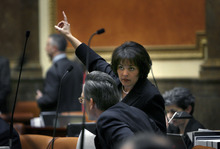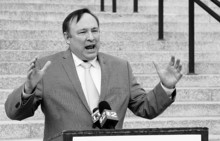This is an archived article that was published on sltrib.com in 2013, and information in the article may be outdated. It is provided only for personal research purposes and may not be reprinted.
Utah Republican and Democratic leaders are united in denouncing Washington for the brinksmanship that has led to a federal shutdown.
"Everybody's to blame: the president, the House, the Senate," said Utah Senate President Wayne Niederhauser, R-Sandy.
"A pox upon all their houses," said Utah Democratic Party Chairman Jim Dabakis, who is also a state senator from Salt Lake City.
"Congress is to blame in total, both sides. They're dysfunctional. They are utterly incapable of getting anything done," said Utah House Speaker Becky Lockhart, R-Provo.
"Gamesmanship is being played out in Washington at the expense of everyday Utahns," said House Minority Assistant Whip Rebecca Chavez-Houck, D-Salt Lake City.
Utah leaders blame both parties in Washington for the shutdown, say it hurts the country and call for Congress to develop some statesmanship to end it. Most say the shutdown makes a loser out of all sides — although former Sen. Bob Bennett, R-Utah, says his Republican Party is losing the most.
"In blunt political terms, it comes out to the benefit of the president," Bennett said in an interview.
—
GOP on wrong side • "The Republicans have a good issue in their opposition to Obamacare. Polls show that 53 percent of Americans are opposed to it" with numbers growing, he said. "As long as they keep the focus on Obamacare, they win."
But he said that focus has now shifted to the shutdown, and polls show 75 percent of Americans oppose it. "They have gone from where they were on the same side as most of the people to a position where they are very much opposed by the majority," he said.
"As soon as they realize they have made a mistake, and it may take a week or more for them to do that, Republican leaders will begin to say, 'The quicker we can get out of this, the better off we will be.' At that point, they will say to their tea-party counterparts, 'You have led us down a path to destruction and we are going to turn around.' "
Bennett was defeated by tea-party champion Mike Lee in 2010, and Lee has been one of the central players in the anti-Obamacare shutdown.
But Utah Republican Party Chairman James Evans says blame for the shutdown should "lay at the feet of President [Barack] Obama because he delayed implementation unconstitutionally of the law that had passed. That opened the door to the whole issue about delayed funding" pushed by such people as Lee.
Gov. Gary Herbert said, "This shutdown underscores the dearth of leadership in Washington, D.C. There's blame to go around, particularly with the president. It is his responsibility to bring people together. He should be talking to GOP leadership every day. Nothing is gained when sides run to the media with derisive labels and divisive platitudes, but nothing will change until leaders actually lead."
—
'Stupid idea' • Still, most shared a view expressed by Bennett about the shutdown — that it's "a really stupid idea."
"It's disgraceful," Dabakis said. "It's disgraceful for Republicans not to recognize that they lost [on the Affordable Care Act], and it's disgraceful for Democrats to have such glee at the awkward situation that Republicans find themselves in. The truth is it's a sad day for everybody. It will alienate the people of Utah from their government even more."
Salt Lake City Mayor Ralph Becker, a Democrat, called the shutdown "yet another unfortunate outcome from a Congress that's been mired down in partisan bickering." He added that to allow it to occur as communities "continue to recover from the recession is unconscionable."
State Auditor John Dougall, a Republican, had a very different take.
"Why is Congress in a tizzy about a government shutdown? They're terrified the public will notice that they're not very necessary," Dougall said.
Utah Senate Democratic Whip Karen Mayne, D-West Valley City, said the shutdown shows, "Compromise is dead. ... Everyone loses. I'm concerned about workers who don't have a paycheck. I'm concerned that the public doesn't have access to their government. ... I hope there are some statesmen who can pull things in the right direction."
Many leaders called for Congress to follow the example of state legislatures, which they say find a way to work together and pass budgets.
—
Rigid ideology • But in Congress, Lockhart said, "I see a very rigid ideology. It's important to stay true to your principles, but you've got to talk with people who disagree with you and respect them for their beliefs. But come to agreement to get things done that need to happen for the American people."
Niederhauser said even in Utah — where Republicans hold super-majorities — there are serious disagreements among the governor, House and Senate. "We come together and work those things out so that we don't have a state shutdown. It can be done."
He adds that members of Congress already know they must come together in a few weeks and probably already know how to do it. "Why run the public and the economy through the mill for weeks?" Niederhauser said. "Quit squabbling. Get together. Work it out for our economy, for our state and all the people."
Leaders note that Utah's members of Congress visit the Legislature every year, and they expect they may get an earful next time about the shutdown and Washington stalemates.
"I'm sure there will be some very difficult questions for the entire delegation about what is going on and what is not going on in Washington," Lockhart said. "The more we see these kinds of things happening in Washington, the more there will be created a critical mass to actually make the changes that need to be made."
Dabakis added, "I think we're in a rare moment where most of the state is united in screaming back to Washington: 'Solve these issues. Get on with governing the country.' "





